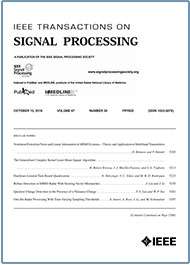- Our Story
- Publications & Resources
- Publications & Resources
- Publications
- IEEE Signal Processing Magazine
- IEEE Journal of Selected Topics in Signal Processing
- IEEE Signal Processing Letters
- IEEE Transactions on Computational Imaging
- IEEE Transactions on Image Processing
- IEEE Transactions on Information Forensics and Security
- IEEE Transactions on Multimedia
- IEEE Transactions on Signal and Information Processing over Networks
- IEEE Transactions on Signal Processing
- IEEE TCI
- IEEE TSIPN
- Data & Challenges
- Submit Manuscript
- Guidelines
- Information for Authors
- Special Issue Deadlines
- Overview Articles
- Top Accessed Articles
- SPS Newsletter
- SigPort
- SPS Resource Center
- Publications FAQ
- Blog
- News
- Dataset Papers
- Conferences & Events
- Community & Involvement
- Professional Development
- For Volunteers
- Information for Authors-OJSP
-
Home
Conferences Events IEEE Signal Processing Magazine IEEE SPL Article IEEE TIFS Article IEEE TMM Article IEEE TSP Article Jobs in Signal Processing Lectures Machine Learning Seasonal Schools Signal Processing News SPM Article SPS Distinguished Lectures SPS Newsletter Article SPS Webinar SPS Webinars SPS Webinar Series Webinar webinars
-
Our Story
What is Signal Processing?

The technology we use, and even rely on, in our everyday lives –computers, radios, video, cell phones – is enabled by signal processing. Learn More » -
Publications & Resources
-
SPS Resources
- Signal Processing Magazine The premier publication of the society.
- SPS Newsletter Monthly updates in Signal Processing
- SPS Resource Center Online library of tutorials, lectures, and presentations.
- SigPort Online repository for reports, papers, and more.
- SPS Feed The latest news, events, and more from the world of Signal Processing.
-
SPS Resources
-
Conferences & Events
-
Community & Involvement
-
Membership
- Join SPS The IEEE Signal Processing Magazine, Conference, Discounts, Awards, Collaborations, and more!
- Chapter Locator Find your local chapter and connect with fellow industry professionals, academics and students
- Women in Signal Processing Networking and engagement opportunities for women across signal processing disciplines
- Students Scholarships, conference discounts, travel grants, SP Cup, VIP Cup, 5-MICC
- Young Professionals Career development opportunities, networking
- Get Involved
-
Technical Committees
- Applied Signal Processing Systems
- Audio and Acoustic Signal Processing
- Bio Imaging and Signal Processing
- Computational Imaging
- Image Video and Multidimensional Signal Processing
- Information Forensics and Security
- Machine Learning for Signal Processing
- Multimedia Signal Processing
- Sensor Array and Multichannel
- Signal Processing for Communication and Networking
- Signal Processing Theory and Methods
- Speech and Language Processing
- Technical Working Groups
- More TC Resources
-
Membership
-
Professional Development
-
Professional Development
- Signal Processing Mentorship Academy (SigMA) Program
- Micro Mentoring Experience Program (MiME)
- Distinguished Lecturer Program
- Distinguished Lecturers
- Distinguished Lecturer Nominations
- Past Lecturers
- Distinguished Industry Speaker Program
- Distinguished Industry Speakers
- Distinguished Industry Speaker Nominations
- Industry Resources
- IEEE Training Materials
- Jobs in Signal Processing: IEEE Job Site
-
Career Resources
- SPS Education Program Educational content in signal processing and related fields.
- Distinguished Lecturer Program Chapters have access to educators and authors in the fields of Signal Processing
- Job Opportunities Signal Processing and Technical Committee specific job opportunities
- Job Submission Form Employers may submit opportunities in the area of Signal Processing.
-
Professional Development
-
For Volunteers
-
For Board & Committee Members
- Board Agenda/Minutes* Agendas, minutes and supporting documentation for Board and Committee Members
- SPS Directory* Directory of volunteers, society and division directory for Board and Committee Members.
- Membership Development Reports* Insight into the Society’s month-over-month and year-over-year growths and declines for Board and Committee Members
-
For Board & Committee Members
Popular Pages
Today's:
- Information for Authors
- Publications & Resources
- (ASRU 2025) 2025 IEEE Automatic Speech Recognition and Understanding Workshop
- IEEE Transactions on Multimedia
- Governance Documents
- Inside Signal Processing Newsletter
- Women in Signal Processing
- Information for Authors OJSP
- SPS BSI Webinar: Integration of Brain Imaging and Genomics with Interpretable Multimodal Collaborative Learning
- IEEE Transactions on Signal Processing
- IEEE Signal Processing Magazine
- Awards & Submit Award Nomination
- Access Restricted
- Call for Proposals: 2028 IEEE International Symposium on Biomedical Imaging (ISBI)
- Explore the Latest in Innovation: Visit the IEEE Signal Processing Magazine March 2025 Issue
All time:
- Information for Authors
- Submit a Manuscript
- IEEE Transactions on Image Processing
- IEEE Transactions on Information Forensics and Security
- IEEE Transactions on Multimedia
- IEEE Transactions on Audio, Speech and Language Processing
- IEEE Signal Processing Letters
- IEEE Transactions on Signal Processing
- Conferences & Events
- IEEE Journal of Selected Topics in Signal Processing
- Information for Authors-SPL
- Conference Call for Papers
- Signal Processing 101
- IEEE Signal Processing Magazine
- Guidelines
Last viewed:
- IEEE Transactions on Multimedia
- Byzantine-Robust and Communication-Efficient Personalized Federated Learning
- Robust Phase Retrieval by Alternating Minimization
- Information for Authors
- IEEE Signal Processing Magazine
- IEEE Transactions on Signal Processing
- SPS BSI Webinar: Integration of Brain Imaging and Genomics with Interpretable Multimodal Collaborative Learning
- Information for Authors OJSP
- Governance Documents
- Women in Signal Processing
- Signal Processing 101
- (ICASSP 2028) 2028 IEEE International Conference on Acoustics, Speech, and Signal Processing
- SPS Webinar: Rapid, Accurate, and Explainable Video Quality Assessment for User-Generated Content
- Board of Governors
- (ICASSP 2022) 2022 IEEE International Conference on Acoustics, Speech and Signal Processing
Semi-Blind, Training, and Data-Aided Channel Estimation Schemes for MIMO-FBMC-OQAM Systems
You are here
Transactions on Signal Processing
Publications & Resources
For Authors
Top Reasons to Join SPS Today!
1. IEEE Signal Processing Magazine
2. Signal Processing Digital Library*
3. Inside Signal Processing Newsletter
4. SPS Resource Center
5. Career advancement & recognition
6. Discounts on conferences and publications
7. Professional networking
8. Communities for students, young professionals, and women
9. Volunteer opportunities
10. Coming soon! PDH/CEU credits
Click here to learn more.
Semi-Blind, Training, and Data-Aided Channel Estimation Schemes for MIMO-FBMC-OQAM Systems
This paper considers and analyzes the performance of semiblind, training, and data-aided channel estimation schemes for multiple-input multiple-output (MIMO) filter bank multicarrier (FBMC) systems with offset quadrature amplitude modulation. A semiblind MIMO-FBMC (SB-MF) channel estimator is developed that exploits both the training symbols and second-order statistical properties of the data symbols, which leads to a significant decrease in the mean squared error (MSE) with respect to its conventional training-based counterpart. Its performance is compared with that of the interference approximation method-based least squares MIMO-FBMC (LS-MF) channel estimator, wherein the channel is estimated using exclusively training symbols. The Cramér–Rao lower bounds are derived to characterize the MSE of the proposed and LS-MF estimators, which interestingly demonstrate that while the MSE per parameter of the proposed scheme decreases with the number of receive antennas, it remains constant for the training-based scheme. The resulting bit error rates are derived for the proposed SB-MF and LS-MF channel estimators. An expectation maximization-based data-aided MIMO-FBMC channel estimator is also investigated that performs iterative maximum a posteriori channel estimation in the E-step followed by data detection in the M-step. A comparative analysis is presented for the computational complexities of the various schemes. Simulation results with practical channel models demonstrate that the proposed semiblind scheme significantly outperforms the training-based and data-aided schemes.
SPS Social Media
- IEEE SPS Facebook Page https://www.facebook.com/ieeeSPS
- IEEE SPS X Page https://x.com/IEEEsps
- IEEE SPS Instagram Page https://www.instagram.com/ieeesps/?hl=en
- IEEE SPS LinkedIn Page https://www.linkedin.com/company/ieeesps/
- IEEE SPS YouTube Channel https://www.youtube.com/ieeeSPS
Home | Sitemap | Contact | Accessibility | Nondiscrimination Policy | IEEE Ethics Reporting | IEEE Privacy Policy | Terms | Feedback
© Copyright 2025 IEEE - All rights reserved. Use of this website signifies your agreement to the IEEE Terms and Conditions.
A public charity, IEEE is the world's largest technical professional organization dedicated to advancing technology for the benefit of humanity.











